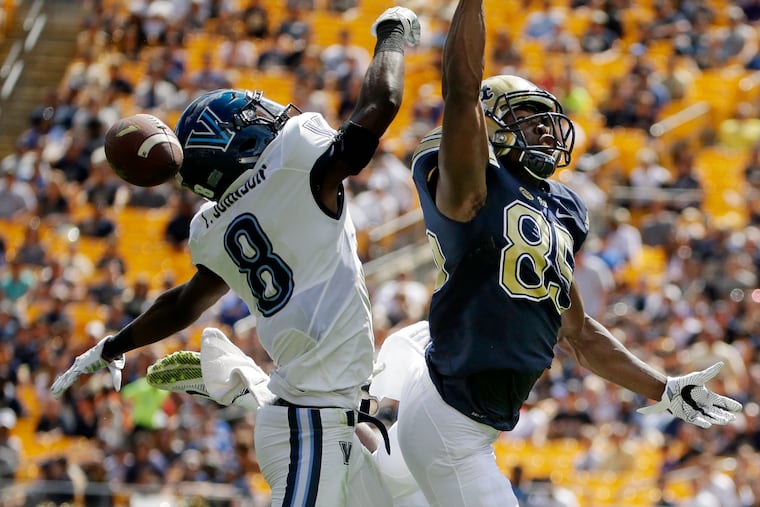Ex-Villanova football player files lawsuit against NCAA for not paying student-athletes
Trey Johnson, who went on to play for the Steelers and Broncos, contends that the NCAA violates federal and state wage laws in not paying athletes.

A former Villanova football player has filed a proposed class-action lawsuit against the NCAA and nearly two dozen of its member schools, alleging that they violate federal and state wage laws by not paying their athletes.
Ralph “Trey” Johnson, a defensive back who spent time with the Pittsburgh Steelers and Denver Broncos but never played in an NFL regular-season game after his time at Villanova, filed the complaint Wednesday in federal court in Philadelphia.
In the suit, Johnson, who is now a member of the practice squad for the Winnipeg Blue Bombers of the Canadian Football League, alleges that the National Collegiate Athletic Association and its universities are joint employers of student-athletes, who are entitled to “the legally required minimum wage for all hours worked.”
Additional defendants in the suit include several colleges located in the Eastern District of Pennsylvania, where the suit was filed, such as Drexel, La Salle, St, Joseph’s, Temple, Penn, Penn State, and Delaware.
The NCAA has faced previous lawsuits seeking to attain pay for student-athletes, including a 2017 suit filed by former Villanova football player Lawrence “Poppy” Livers. That case was dismissed in 2018.
Student-athletes, the new suit says, have their hours tracked “like students employed in Work Study programs” by “adult supervisors” who “maintain time sheets for both.” However, unlike “student ticket takers, seating attendants, and food concession workers at NCAA contests,” who are paid “on a minimum wage scale averaging $10.53 to $13.36 per hour under Work Study,” student-athletes receive no pay.
In a statement from the NCAA class action suit, Johnson said: “We filed this lawsuit because tens of thousands of women and men are laboring for the benefit of the NCAA and are not even receiving the basic minimum wage for their work. This is not about being paid hundreds of thousands of dollars, and we are not limiting this case only to the select few athletes that can receive endorsement deals.
"We are simply asking the NCAA to pay its student-athletes the basic minimum wage as required by federal law. They pay the students who tear the tickets and sell popcorn at our games. The least that the NCAA can do for those who bring so much money to the NCAA and its schools would be to pay them the minimum wage.”
Johnson’s suit comes following the NCAA’s recent announcement that it would consider letting student-athletes profit from the use of their names, images, and likenesses. The organization last month voted to have its divisions consider policy changes that would allow student-athletes to market themselves by January 2021. However, attorney Michael J. Willemin, of the New York law firm Wigdor LLP, said the NCAA did not go far enough in its decision.
“The NCAA’s recent move to permit student-athletes to benefit from their name, image, and likeness illustrates that the untenable amateurism model is simply a smokescreen used to protect the pockets of the NCAA and its member schools,” Willemin said in a statement. “By refusing to pay athletes the minimum wage, the NCAA is essentially saying that it is okay for athletes to be paid, as long as someone else is cutting the check.”
Attorney Paul L. McDonald, of PL McDonald LLC of Philadelphia, who is also representing Johnson in this case, outlined why he is confident that this will be a successful case.
“All you have to do is apply the test,” he said. “We have the test laid out very much in detail in the complaint. It is clear by comparison to work-study students. That is the key. The key is we are not doing something theoretical. The key is we have a benchmark on campus right now, the work-study students, and I am including any student employed by the university. We simply compare, using the criteria to the student athletes, and the results are pretty obvious. The student athletes meet the criteria more than the work-study students did.”
The NCAA said the lawsuit ignores previous, unsuccessful claims on the matter.
“Importantly, it ignores previous court rulings that student-athletes are not university employees. The NCAA remains confident that courts will continue to uphold the precedent set by prior decisions,” Donald Remy, the NCAA’s chief operating officer and chief legal officer, said in a statement.
In his four seasons at Villanova, Johnson recorded 120 tackles and four interceptions. Johnson was recruited to Villanova by Andy Talley, who retired following the 2016 season.
“He is a good kid, a good player for us, and was a defensive back and very serious young man,” Talley said in a phone interview. “He did a good job in the classroom and is a straightforward guy.”
The CFL’s Blue Bombers gave the following response to a request for an interview with Johnson.
“We are preparing for a playoff game this weekend, and although I appreciate your inquiry, we won’t be making Trey available for this,” said Darren Cameron, senior director of public and player relations.